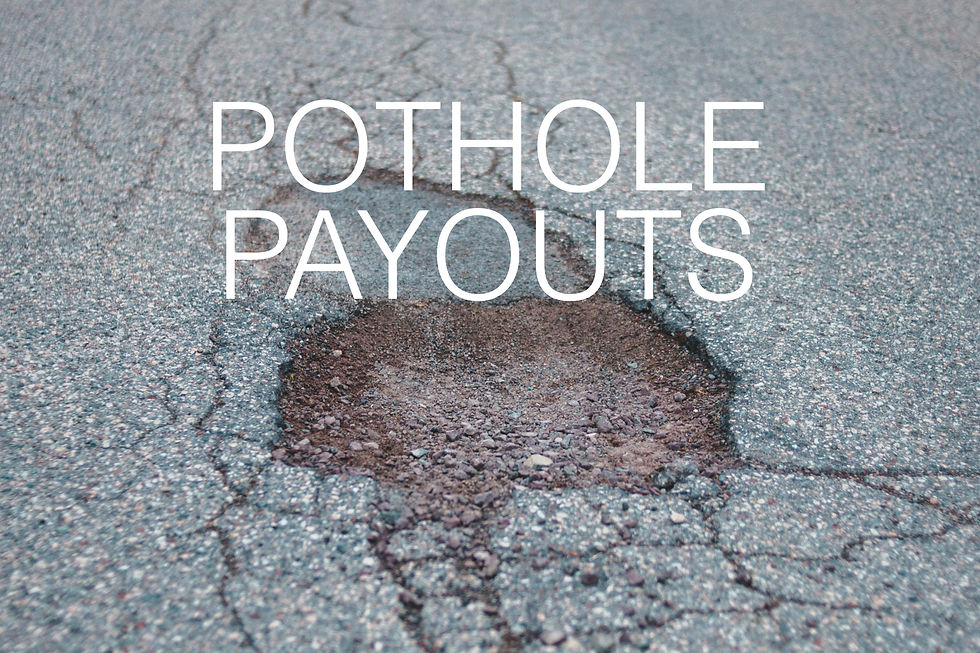Pothole claims surge, but payouts remain slim pickings for motorists
- Perry Richardson

- Nov 22, 2024
- 3 min read

The number of pothole compensation claims across Britain’s largest local road networks has seen a staggering increase, yet the odds of drivers receiving payouts remain slim. Data analysed by the RAC reveals claims more than doubled from 8,327 in 2022 to 20,432 in 2023, but councils rejected the majority.
A Freedom of Information (FOI) request to 21 councils covering nearly 92,200 miles of local roads showed Surrey County Council experiencing the largest surge, with claims rising from 734 in 2022 to 3,418 in 2023. Hampshire followed closely, with claims increasing from 750 to 2,654, while Gloucestershire saw claims jump from 257 to 829.
Despite the sharp rise, only 15% of claims were paid out in 2023. The total compensation of £824,000 equates to an average of £260 per successful claim, far below the average repair cost of £460 for more significant damage, according to RAC garage data.
Most councils remain reluctant to compensate drivers. Of the 17 councils paying out any claims, 76% refused over three-quarters of submissions. Five councils turned down nine-in-ten claims, with Gloucestershire rejecting 98% and Essex 95%. Surrey, receiving the highest volume of claims, refused 86%.
Shropshire Council was the exception, approving 68% of its claims. Across the board, however, the refusal rate has grown from 76% in 2021 to 81% in 2023.
A common reason for rejecting claims lies in Section 58 of the Highways Act 1980, which exempts councils from liability if they were unaware of a pothole. Of the claims rejected by nine councils providing data, 74% were refused on these grounds. Gloucestershire and Hertfordshire rejected all claims under this defence.
The data highlights significant variation in claims per mile of road. Surrey led with one claim per mile across its 3,410-mile network. Hampshire, Essex, and Hertfordshire each received one claim per two miles of their networks. Gloucestershire had one claim for every four miles.
Defending claims has also become costly. Thirteen councils spent over £166,000 in legal fees in 2023. Lincolnshire accounted for more than half, spending nearly £96,000. Devon and Essex followed, spending £33,232 and £19,685, respectively.
The findings paint a clear picture of the growing frustrations facing drivers, as claims soar but payouts remain elusive. Councils, meanwhile, continue to rely heavily on legal defences, leaving many motorists footing the bill for pothole damage.
RAC Head of Policy, Simon Williams, said: “These findings are a stark reminder that the ongoing poor condition of many of the UK’s local roads is burning holes in the budgets of both local authorities and drivers.
“While some councils appeared to prioritise paying legal fees over settling pothole claims, the cost in time and money of defending claims appears to far outweigh the expense of reimbursing drivers for the damage done to their vehicle in the first place. Even if a driver successfully pursued compensation, the average sum paid out of £260 is often well below the cost to fix a pothole-damaged car, for anything more serious than a punctured tyre.
“When it comes to the true extent of the problem, we may only be seeing the tip of the iceberg, as almost the same number of councils refused to tell us why they threw out pothole claims compared to those that did. We strongly urge drivers to inform councils about any potholes they are aware of, either via the RAC’s website or using the free Stan app which collects data on the state of UK roads.
“We have long argued that local authorities need greater certainty of funding so they can tackle to the root cause of the UK’s pothole plague. For this reason, we’re pleased they’ll receive £500m to soon start the process of improving their road networks. It’s vital that this money is used by councils not to merely fill potholes, but to carry out preventative maintenance – through surface dressing roads at regular intervals to stop roads falling apart in the first place. Roads that are beyond reasonable repair should be resurfaced.”








